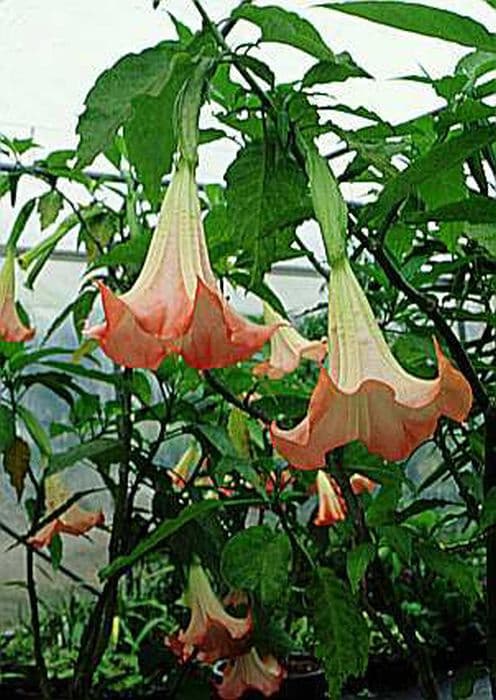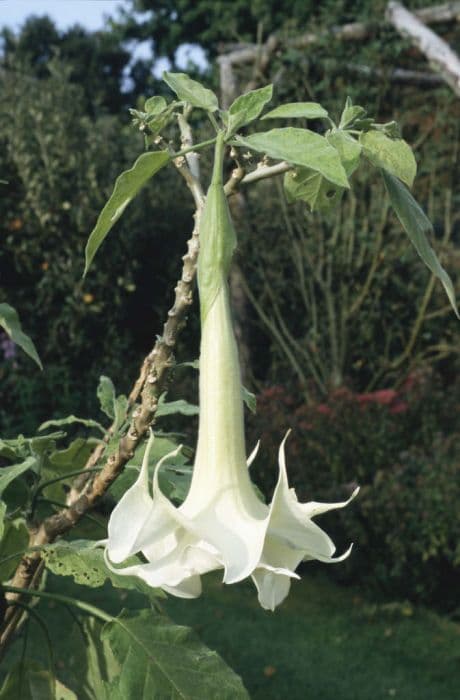Petunia Petunia 'Johnny Flame'

ABOUT
Petunia 'Johnny Flame' is a striking variety that showcases vibrant blossoms with a vivid, velvety appearance. The petals display a deep red color mingled with a smoky overlay that can appear almost black in certain lighting. These stunning blooms typically exhibit a funnel-like shape, which is characteristic of petunias, and cascade with a lush fullness that is appealing to the eye. The foliage of the 'Johnny Flame' consists of green leaves that provide a stark contrast to the intense color of the flowers, enhancing their visual impact. The leaves are slightly textured, adding to the overall lushness of the plant's appearance. It gives off a showy display of colors and textures, which often attracts gardeners looking for a bold and dramatic addition to their garden or containers. In addition to its striking colors, the 'Johnny Flame' carries the quintessential petunia floral scent, lightly perfuming the area around it, especially in the early evening. The overall appearance of the plant is one of rich elegance, with the stunning flowers often becoming the focal point of any planting arrangement.
About this plant
 Names
NamesFamily
Solanaceae
Synonyms
Johnny Flame Petunia
Common names
Petunia 'Johnny Flame'
 Toxicity
ToxicityTo humans
Petunias, including the 'Johnny Flame' variety, are not known to be toxic to humans. They are generally considered safe and are not associated with poisoning or toxic symptoms if ingested.
To pets
Petunias, including the 'Johnny Flame' variety, are not considered toxic to pets. They are commonly regarded as non-toxic to both cats and dogs. Therefore, ingestion of petunias should not cause any significant symptoms of poisoning in pets.
 Characteristics
CharacteristicsLife cycle
Annuals
Foliage type
Deciduous
Color of leaves
Green
Flower color
Mixed
Height
1 foot (0.3 meters)
Spread
1 foot (0.3 meters)
Plant type
Herb
Hardiness zones
9
Native area
South America
Benefits
 General Benefits
General Benefits- Vibrant Coloration: Petunias are known for their bright and varied colors, which can add a striking visual appeal to gardens, patios, and landscapes.
- Continuous Blooming: Petunias typically bloom throughout the entire growing season, offering long-lasting floral displays.
- Low Maintenance: They are considered easy to care for, requiring minimal upkeep once established, which is ideal for both novice and experienced gardeners.
- Attracts Pollinators: Petunias can attract bees, butterflies, and other beneficial pollinators, which is essential for the health of your garden and the environment.
- Versatility: They are suitable for use in a variety of settings, including hanging baskets, container gardens, window boxes, and as bedding plants.
- Drought Tolerance: Once established, petunias can tolerate periods of dry weather, making them suitable for gardens in warmer climates.
- Range of Sizes: Petunias come in different sizes and growth habits, from compact to spreading varieties, giving gardeners flexibility in their landscaping choices.
 Medical Properties
Medical PropertiesThis plant is not used for medical purposes.
 Air-purifying Qualities
Air-purifying QualitiesThis plant is not specifically known for air purifying qualities.
 Other Uses
Other Uses- Color dye: Petals of the Johnny Flame can be used to create a natural dye for fabrics or crafting projects due to their vibrant color.
- Decorative ice cubes: Freeze individual petals in ice cube trays for a decorative touch in beverages at a garden party.
- Jewelry making: The flowers can be dried and preserved in resin to create unique pieces of jewelry.
- Photography prop: The vivid blooms can add an appealing pop of color to still-life photography or as part of a botanical photo series.
- Culinary garnish: Although not commonly consumed, the non-toxic petals can be used to decorate cakes and desserts for special occasions.
- Plant pigment for art: The flower's juice can serve as a watercolor paint or a natural ink for artistic endeavors.
- Educational tool: Petunia flowers can be dissected to study the plant's reproductive system in biology classes.
- Handmade paper: Incorporate chopped petals into paper pulp to create textured and colorful handmade paper.
- Scented bookmarks: Dry the flowers and attach them to cardstock to make fragrant bookmarks.
- Traditional celebrations: In some cultures, flower petals are used in ceremonies or celebrations as a symbol of affection and beauty.
Interesting Facts
 Feng Shui
Feng ShuiThe Petunia is not used in Feng Shui practice.
 Zodiac Sign Compitability
Zodiac Sign CompitabilityThe Petunia is not used in astrology practice.
 Plant Symbolism
Plant Symbolism- Anger and Resentment: Petunias are sometimes associated with feelings of anger or resentment, which could play into the 'Flame' aspect of 'Johnny Flame,' symbolizing fiery emotions.
- Desire: The vibrant colors and lively nature of petunias can represent a strong desire or passion, fitting with the intensity of the name 'Johnny Flame.'
- Comfort: Despite some negative connotations, petunias are often thought to bring comfort and the presence of the plant could be a reminder that even in fiery times, there's also solace.
 Water
WaterPetunias require regular watering to keep the soil moist but not soggy. During active growth periods, watering Petunias 'Johnny Flame' deeply once a week is generally sufficient; however, they may require more frequent watering if conditions are very hot or dry. Each plant should receive about one gallon of water, ensuring that the entire root zone is saturated. Reduce watering in cooler or rainy periods to prevent waterlogged soil. Always avoid overhead watering to reduce the risk of disease and instead water at the base of the plant.
 Light
LightPetunias thrive in full sunlight, which promotes healthy growth and abundant flowering. Place Petunias 'Johnny Flame' in a spot where they will receive a minimum of six to eight hours of direct sunlight per day. These plants perform best and flower most prolifically when they have ample exposure to intense light.
 Temperature
TemperaturePetunias prefer moderate to warm temperatures and will flourish when the daytime temperature is between 60 to 85 degrees Fahrenheit, though they can survive in temperatures as low as 40 degrees and as high as 90 degrees Fahrenheit. Ideal conditions are reached when night temperatures do not drop below 60 degrees, which encourages continued flowering and robust growth.
 Pruning
PruningPruning Petunias encourages bushier growth and more blooms throughout the season. Deadhead spent flowers of Petunias 'Johnny Flame' regularly to promote new growth and remove any damaged or yellowing leaves. Perform a more extensive pruning or "pinching back" by trimming the stems by a few inches in midsummer to rejuvenate the plants and encourage a new flush of flowers.
 Cleaning
CleaningAs needed
 Soil
SoilThe best soil mix for Petunia 'Johnny Flame' is a well-draining potting mix with a pH between 5.5 and 6.5. It should include a balance of peat moss, perlite, and loam to ensure proper drainage and aeration while retaining some moisture. Adding a slow-release fertilizer can also be beneficial for nutrient supply.
 Repotting
RepottingPetunias, including 'Johnny Flame', should generally be repotted annually, especially if they are grown in containers. They appreciate fresh soil each year to renew nutrients and to accommodate the growing root system. If they are performing well, you can simply refresh the top layer of soil instead of a full repot.
 Humidity & Misting
Humidity & MistingPetunias like 'Johnny Flame' prefer moderate humidity levels. While they can tolerate a range of humidity conditions, they are generally happiest with ambient humidity found in most homes and do not require any special humidity adjustments.
 Suitable locations
Suitable locationsIndoor
Provide bright light, regular watering, and monthly fertilizing.
Outdoor
Full sun, well-drained soil, regular watering, deadhead spent flowers.
Hardiness zone
9-11 USDA
 Life cycle
Life cycleThe life of a Petunia begins with a seed, which germinates in warm, moist soil conditions, usually in the spring. Following germination, a seedling emerges, quickly developing true leaves and a root system. As the petunia grows, it enters a vegetative stage, with stems elongating and leaves expanding to capture sunlight for photosynthesis. After this period of growth, the plant enters the flowering stage, where 'Johnny Flame' Petunias display their characteristic vibrant, trumpet-shaped flowers, attracting pollinators for reproduction. These flowers eventually give way to seed capsules, which when mature, release seeds for the next generation. Lastly, as an annual plant, after setting seed, the Petunia 'Johnny Flame' completes its life cycle and dies, usually with the onset of colder weather.
 Propogation
PropogationPropogation time
Spring-Early Summer
Propogation: Petunia 'Johnny Flame', like other petunias, is most commonly propagated through seed. The ideal time to sow petunia seeds is in late winter to early spring, which allows the plants to reach a suitable size before being transplanted outside after the danger of frost has passed. To propagate by seed, scatter the tiny seeds on the surface of a well-draining seed starting mix in a tray or pots and gently press them into the medium. Do not cover the seeds with soil as they need light to germinate. Ensure the soil stays moist but not waterlogged and maintain a consistent temperature of around 70-75 degrees Fahrenheit (21-24 degrees Celsius) for optimal germination. Seedlings typically emerge in 7 to 14 days, at which point they can gradually be exposed to stronger light and eventually harder to outdoor conditions before planting out.


![Calibrachoa [Aloha Classic Blue Sky]](/_next/image?url=https%3A%2F%2Fplants-admin.emdemapps.com%2Fimages%2Fplants%2F%2Fimages%2F604b636c3778b.png&w=640&q=75)
![Calibrachoa [Aloha Classic Gold]](/_next/image?url=https%3A%2F%2Fplants-admin.emdemapps.com%2Fimages%2Fplants%2F%2Fimages%2F604b6284c573e.png&w=640&q=75)
![Calibrachoa [Aloha Classic Tiki Soft Pink]](/_next/image?url=https%3A%2F%2Fplants-admin.emdemapps.com%2Fimages%2Fplants%2F%2Fimages%2F604b548e0a5ef.png&w=640&q=75)
![Calibrachoa [Cabaret Deep Yellow]](/_next/image?url=https%3A%2F%2Fplants-admin.emdemapps.com%2Fimages%2Fplants%2F%2Fimages%2F604b5f20ca3ef.png&w=640&q=75)
![Calibrachoa [Calibasket Radiant Orange]](/_next/image?url=https%3A%2F%2Fplants-admin.emdemapps.com%2Fimages%2Fplants%2F%2Fimages%2F604b536d43cb2.png&w=640&q=75)
![Calibrachoa [Caloha Classic Blue Velvet]](/_next/image?url=https%3A%2F%2Fplants-admin.emdemapps.com%2Fimages%2Fplants%2F%2Fimages%2F604b604884a75.png&w=640&q=75)
![Calibrachoa [Caloha Classic Honey White]](/_next/image?url=https%3A%2F%2Fplants-admin.emdemapps.com%2Fimages%2Fplants%2F%2Fimages%2F604b5f56e0beb.png&w=640&q=75)
![Calibrachoa [Caloha Classic Yellow Chocolate Ring]](/_next/image?url=https%3A%2F%2Fplants-admin.emdemapps.com%2Fimages%2Fplants%2F%2Fimages%2F604b538aede95.png&w=640&q=75)